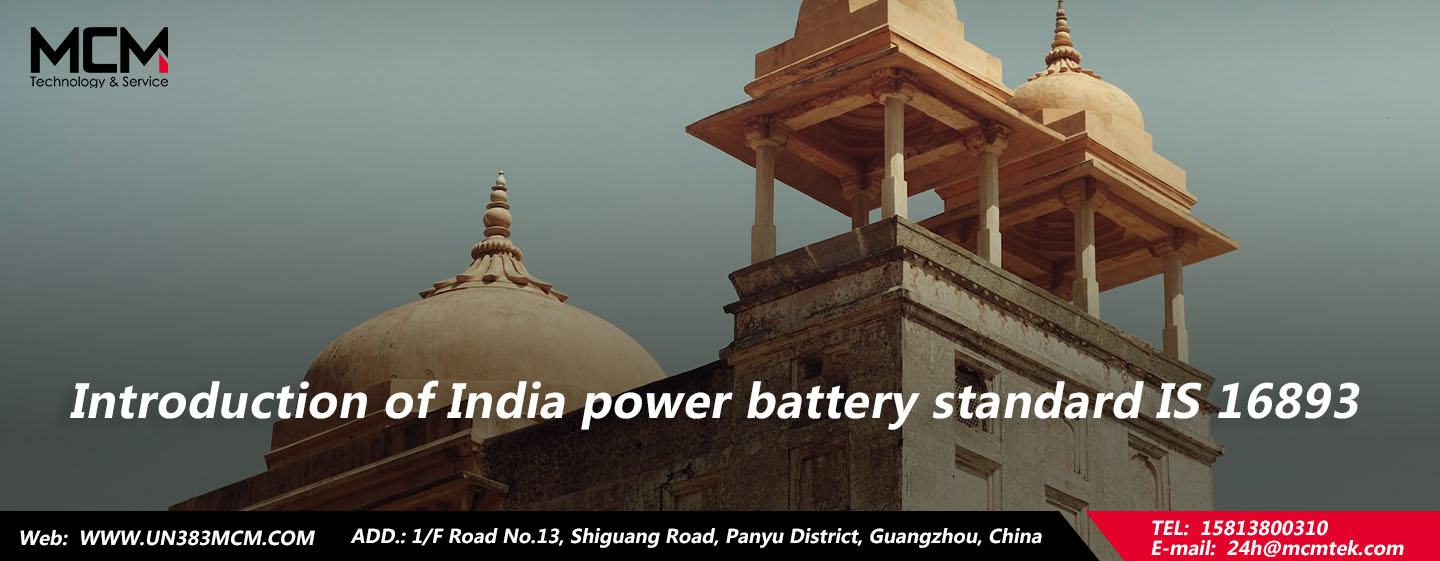
Overview:
Recently Automotive Industry Standards Committee (AISC) released standard AIS-156 and AIS-038 (Rev.02) Amendment 3. The test objects of AIS-156 and AIS-038 are REESS (Rechargeable Energy Storage System) for automobiles, and the new edition adds that the cells used in REESS should pass tests of IS 16893 Part 2 and Part 3, and at least 1 charge-discharge cycle data should be provided. The following is a brief introduction to the test requirements of IS 16893 Part 2 and Part 3.
IS 16893 Part2:
IS 16893 is apply to the secondary lithium-ion cell used in electrically propelled road vehicles propulsion. Part 2 is about the test of reliability and abuse. It is consistent with IEC 62660-2: 2010 “Secondary lithium-ion cells used in electrically propelled road vehicles propulsion – Part 2: test of reliability and abuse” published by the International Electrotechnical Commission (IEC). The test items are: capacity check, vibration, mechanical shock, crush, high-temperature endurance, temperature cycling, external short-circuit, overcharging and forced discharging. Among them are the following key test items:
- High-temperature endurance: cells of 100 % SOC( BEV) and 80 % SOC( HEV) need to be placed at 130℃ for 30min.
- External short-circuit: cells of 100% SOC need to be shorted for 10 minutes at an external resistance of 5mΩ.
- Overcharging: application of voltage to twice the maximum voltage specified by the manufacturer or a power level of 200% SOC is needed. BEV needs to be charged with 1C and HEV needs to be charged with 5C.
The items above are about cell performance. They require high performance of cell materials, like the separator. Therefore manufacturers should pay much attention to them
The above three tests require extra attention to the safety performance of the cell, especially the safety of the internal materials, such as the diaphragm.
IS 16893 Part3:
IS 16893 Part 3 is about safety requirements. It is consistent with IEC 62660-3: 2016 “Secondary lithium-ion cells used in electrically propelled road vehicles propulsion – Part 3: safety requirements”. The test items are: capacity check, vibration, mechanical shock, crush, high-temperature endurance, temperature cycling, overcharging, forced discharging and forced internal short-circuit. The following items are important.
- Test methods of vibration, mechanical shock, temperature cycling, short-circuit refer to IEC 62660-2:2010. Actually, the test method is the same as IS 16893 Part 2.
- High-temperature endurance: In addition to the need to be placed at 130 ℃ for 30min, one-hour observation on cell is also needed after turning off the heater.
- Overcharging: application of a voltage of 120 % of the maximum voltage specified by the manufacturer, or a charge of 130 % SOC is needed.
- The test parameters of crush and forced discharging are slightly different from IEC 62660-2: 2010.
The test method of forced internal short-circuit refers to IEC 62619.
Warm Tips:
It is worth noting that although IS 16893 Part 2 and IS 16893 Part 3 have some of the same test items, the verdicts are not the same. Part 2 needs to assess the reliability of the cells, collect the basic data of reliability and abuse behavior. The test report needs to record the current, voltage and temperature data and describe the test results of the cells, and there is no requirement to determine whether the test results are passed or not. However, Part 3 specifies the conditions for passing the test, such as the cell cannot catch fire and explode during the test, if not, the test will fail.
If you have any other questions about this standard and the test application, please feel free to contact our customer service or sales.

Article Source: https://www.un383mcm.com/news/introduction-of-india-power-battery-standard-is-16893/
Media Contact
Company Name: Guangzhou MCM Certification Testing Co.,Ltd.
Email: Send Email
Phone: 13622887960
Country: China
Website: https://www.un383mcm.com/

